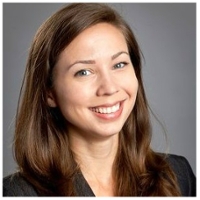JMU Graduate Student Combines Business and Environmental Sustainability
Graduate SchoolSUMMARY: She didn't know where it would take her, but Kim has no regrets about traveling to the Mediterranean island of Malta to participate in a brand new JMU Graduate Program. Kim says she was the first applicant to the inaugural cohort of the ISAT program in Sustainable Environmental Resource Management taught in partnership with the University of Malta.
ISAT Alum Combines Business and Environmental Sustainability
 ISAT alum, Kimberlee (Kim) Robertella Glinka (2010), currently serves as the Associate Director for the Center for Social Value Creation at the Robert H. Smith School of Business at the University of Maryland. The center works with students, faculty and business partners to help balance profits and the public good. They promote business models that leverage cross-disciplinary collaboration and encourage market-based problem solving to create economic prosperity and social and environmental well-being. Kim brings many qualities to this role, many of which come from the education and experience she gained in the Integrated Science and Technology (ISAT) program at JMU.
ISAT alum, Kimberlee (Kim) Robertella Glinka (2010), currently serves as the Associate Director for the Center for Social Value Creation at the Robert H. Smith School of Business at the University of Maryland. The center works with students, faculty and business partners to help balance profits and the public good. They promote business models that leverage cross-disciplinary collaboration and encourage market-based problem solving to create economic prosperity and social and environmental well-being. Kim brings many qualities to this role, many of which come from the education and experience she gained in the Integrated Science and Technology (ISAT) program at JMU.
She didn’t know where it would take her, but Kim has no regrets about traveling to the Mediterranean island of Malta to participate in a brand new JMU Graduate Program. Kim says she was the first applicant to the inaugural cohort of the ISAT program in Sustainable Environmental Resource Management taught in partnership with the University of Malta.
After earning her Bachelor of Science degree in Business Management at Penn State, Kim held management, marketing and communications positions at companies that focused on renewable energy. Passionate about the intersection of business and environmental sustainability, she was seeking ways to advance her career.
The interdisciplinary nature of the ISAT master’s program was appealing to her. She learned from professors and students from a wide range of fields, including the sciences, engineering, and mathematics, as well as the political and social sciences, and international affairs, among others. During the program, as teams of students and faculty collaborated on projects, she saw how important it was to obtain stakeholder buy-in for a project to be successful. She valued ongoing dialogue as an essential step in sharing knowledge and creating solutions amidst diverse perspectives.
When reflecting on her experience, Kim noted the significance of learning about sustainable resource management on a small island, where the boundaries of the island create a brilliant real-world laboratory for students. In an island ecosystem, soil, water and other resources are limited, and waste management is critical. It is far too easy to expend vital resources, and all too simple to contaminate what is available. The island of Malta is a wonderful learning laboratory.
The JMU “Malta Program,” as it was nicknamed, has been redeveloped and renamed “Environmental Management and Sustainability” since Kim completed it; however, it continues to equip students with a range of vital skills for engaging in meaningful discourse and practice for environmental sustainability in a variety of venues.

